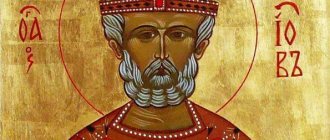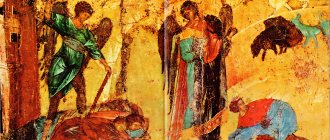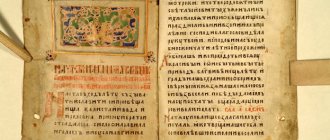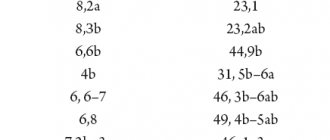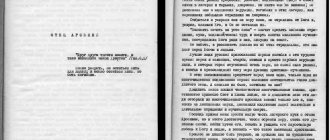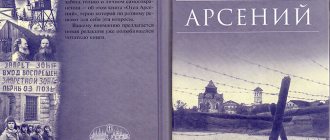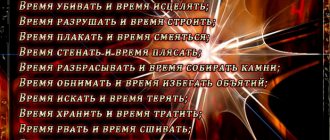Authorship
There are many different opinions about the time of its origin and the author, as well as about the nature of the book itself. According to some, this is not history at all, but a pious fiction, according to others, the book mixes historical reality with mythical embellishments, and according to others, accepted by the church, this is a completely historical story about a real event. The same fluctuations are noticeable in opinions regarding the author of the book and the time of its origin. According to some, its author was Job himself, according to others - Solomon, according to others - an unknown person who lived no earlier than the Babylonian captivity. The general impression drawn from an examination of the internal and external features of the book is in favor of its antiquity, which, moreover, can be determined with sufficient probability.
Notes
- [slovari.yandex.ru/%D1%82%D0%B5%D1%85%D0%B8%D0%BB%D0%B8%D0%BC/%D0%91%D0%B8%D0%B1%D0 %BB%D0%B8%D0%BE%D0%BB%D0%BE%D0%B3%D0%B8%D1%87%D0%B5%D1%81%D0%BA%D0%B8%D0%B9 %20%D1%81%D0%BB%D0%BE%D0%B2%D0%B0%D1%80%D1%8C/%D0%9F%D1%81%D0%B0%D0%BB%D1% 82%D0%B8%D1%80%D1%8C/ Psalter] (Russian) // Men A.
Bibliological Dictionary. - M.: Alexander Men Foundation, 2002. - T. 2. - ISBN 5-89831-020-7. - [otveti.org/tolkovanie-biblii/iov/ Interpretation of the Bible, Book of Job.]
- [rubible.com/article/452 When Did Job Live? — ruBible.com | Synodal Translation]
- [idrp.ru/zhitiya-svyatih-lib468/ Long-suffering Job is righteous | Lives of Saints by Dmitry of Rostov]
- Berdyaev N. A.
[krotov.info/library/02_b/berdyaev/1937_034_05.html “Spirit and reality, ch. 5. Evil and suffering as problems of the spirit]
Story time
The story of Job dates back to a time before Moses, or at least earlier than the widespread circulation of the Pentateuch of Moses. The silence in this narrative about the laws of Moses, the patriarchal features in life, religion and morals - all this indicates that Job lived in the pre-Mosaic era of biblical history, probably at the end of it, since in his book signs of the highest development of social life are already visible. life. Job lives with considerable splendor, often visits the city, where he is greeted with honor as a prince, judge and noble warrior. He contains references to courts, written charges and correct forms of legal proceedings. The people of his time knew how to observe celestial phenomena and draw astronomical conclusions from them. There are also indications of mines, large buildings, tomb ruins, as well as major political upheavals, during which entire peoples who had hitherto enjoyed independence and prosperity were plunged into slavery and destitution. One can generally think that Job lived during the stay of the Jews in Egypt.
Job responds to God
Job's response to God is indicative
Job 42 chapter
2 I know that You can do everything, and that Your purpose cannot be stopped.
3 Who is this one who darkens Providence, not understanding anything? (Job quotes the words of God, agreeing that the Lord gave a correct assessment of his unreasonable attacks) - So, I spoke about what I did not understand, about things that were wonderful to me, which I did not know.
4 Listen, I cried, and I will speak, and what I will ask You, explain to me .
5 I have heard of You by the hearing of the ear; now my eyes see You;
6 therefore I renounce and repent in dust and ashes.
What is Job denying? From the one who taught God, he demanded an answer and explanation from Him. Job humbled himself and accepted the situation allowed by the Lord. Although God never directly explained to him the reasons for what happened, but only hinted at a third force responsible for what happened. But it was enough for Job that God showed him His omniscience, power and righteousness!
Content
The main subject of the book of Job is his suffering and illness, as a result of which various questions arise about the ways of God's Providence regarding the world and man: why are the virtuous often unhappy, and the vicious prosper? and how to reconcile the unequal distribution of earthly goods between good and evil with the actions of God's Providence in the world? Moral principles, fear of God, faith and trust in God, purity and integrity of life, love and justice for others, complacent enduring of misfortunes, charity and mercy towards the poor, etc., all this most importantly constitutes the content of Job’s conversations with friends and represents edifying lessons all the above-mentioned virtues in the face of the suffering Job himself.
For example, what a sublime example of humility and complete devotion to the will of God is heard in his words when he, generously endowed by God with all the gifts of happiness and suddenly deprived of everything - both his numerous herds and all his children, exclaimed: “Naked I came from my mother’s womb, naked and I'll come back. The Lord gave, the Lord took away, as the Lord pleased, so it was done, blessed be the name of the Lord!”
(Job 1:21);
or, for example, in his answer to his wife, when in his illness she inspired him with blasphemous words against God: “You speak like one of the madmen.
Will we really accept good from God, but not evil?” (Job 2:10).
True, under the weight of his fierce suffering and the unfair accusations of his friends, he cursed even the day of his birth, but even in the midst of the murmur, the greatness of his soul and the hope for the future resurrection from the dead clearly shine through: “I know,” he exclaims, “My Redeemer lives.” , and on the last day He will raise from the dust this decaying skin of mine;
and in my flesh I will see God” (Job 19:25-26).
The New Testament (1 Cor 3:19) directly refers to the book of Job as the canonical Old Testament book of the Holy Scriptures. Scriptures. The Church has deeply understood the story of Job; in his suffering she saw the suffering Lord and from ancient times she decided to read his book in the first four days of Passion Week.
Interpretations
The Book of Job has had numerous interpreters, from ancient times to modern times. Among the ancients it was interpreted by Ephraim the Syrian, Gregory the Great, Augustine the Blessed, Maimonides and others.
The fate of Job is, as it were, a prototype of human fate on earth. The ancient Jewish people were characterized by the belief that the blessings of life and happiness are given to a person for a virtuous life. And if the blessings of life are taken away from him and he becomes unhappy, then this means that his virtue has been shaken and he has sinned. Rewards and punishments are given to a person within the confines of earthly life. With such a consciousness, it is difficult to understand innocent suffering. Job's friends and comforters could not understand him. Job was a pious and virtuous man, he always revered God and was submissive to His law. But such a person is deprived of all the blessings of life, and he becomes the most unhappy of people, his suffering is unbearable. The friends who consoled him tried to find any sins in Job that would justify his unfortunate fate as expedient and meaningful. But Job insisted on his own. He rebelled against God and fought against God, appealed to divine justice. God justified Job and condemned his comforters. It is very difficult for people to reject the purposefulness of everything that happens in the world and, therefore, it is difficult to understand innocent suffering. It seems to many that if there is innocent suffering, then it means there is no God, there is no providence of God.
— N. A. Berdyaev [5]
Literature
- [www.eleven.co.il/article/11800 Job]
- article from the Electronic Jewish Encyclopedia - [www.agape-biblia.org/books/Book03/Text/Br_K.htm#_Toc19334206 Book of Job] // Brockhaus Biblical Encyclopedia / Fritz Rinecker; Gerhard Mayer; Alexander Schick, Ulrich Wendel. - M.: Christliche Verlagsbuchhandlung Paderborn, 1999. - 1226 p.
- Lopukhin A.P.
Job, biblical character // Encyclopedic Dictionary of Brockhaus and Efron: in 86 volumes (82 volumes and 4 additional). - St. Petersburg, 1890-1907. - Shchedrovitsky D.V. Conversations about the Book of Job. Why does the righteous suffer? M.: Oklik, 2009.—235 p. — ISBN 978-5-91349-009-4.
- Jung K. G.
[castalia.ru/library-psychology/261-karl-yung-otvet-iovu.html Answer to Job]. M.: AST Publishing House LLC, 2001
Links
Prophets Yeshua • Shoftim • Shmuel Aleph • Shmuel Bet • Mlahim Aleph • Mlahim Bet • Yeshayahu • Yirmiyahu • Yechezkel • Hoshea • Yoel • Amos • Ovadia • Yonah • Micah • Nachum • Havakuk • Tzphaniah • Hagai • Zecharya • Mala'chi Scriptures Tehillim • Mishlei • Job • Shir HaShirim • Ruth • Eicha • Kohelet • Esther • Daniel • Ezra • Nehemiah • Divrei Ha-Yamim (Aleph/Beth) Historical Joshua • Judges of Israel • Ruth • Samuel {Samuel (1st Kings • 2nd Kings) • Kings (1st Kings • 2nd Kings)} • Chronicles (1st • 2nd) • Ezra ( 1st • 2nd* • 3rd*) • Nehemiah • Tobit* • Judith* • Esther Educational Job • Psalms • Proverbs of Solomon • Ecclesiastes • Song of Songs • Wisdom of Solomon* • Wisdom of Jesus, son of Sirach* Prophets Isaiah • Jeremiah • Lamentations • Jeremiah* • Baruch* • Ezekiel • Daniel • Hosea • Joel • Amos • Obadiah • Jonah • Micah • Nahum • Habakkuk • Zephaniah • Haggai • Zechariah • Malachi • Maccabees* (1st* • 2nd* • 3rd*) Deuterocanonical books are marked with *
Passage characterizing the Book of Job
- Why is this guy driving in front of the line? – someone shouted at him again. “Take it left, take it right,” they shouted to him. Pierre turned to the right and unexpectedly moved in with the adjutant of General Raevsky, whom he knew. This adjutant looked angrily at Pierre, obviously intending to shout at him too, but, recognizing him, nodded his head to him. - How are you here? – he said and galloped on. Pierre, feeling out of place and idle, afraid to interfere with someone again, galloped after the adjutant. - This is here, what? Can I come with you? - he asked. “Now, now,” answered the adjutant and, galloping up to the fat colonel standing in the meadow, he handed him something and then turned to Pierre. - Why did you come here, Count? - he told him with a smile. -Are you all curious? “Yes, yes,” said Pierre. But the adjutant, turning his horse, rode on. “Thank God here,” said the adjutant, “but on Bagration’s left flank there is a terrible heat going on.” - Really? asked Pierre. - Where is this? - Yes, come with me to the mound, we can see from us. “But our battery is still bearable,” said the adjutant. - Well, are you going? “Yes, I’m with you,” said Pierre, looking around him and looking for his guard with his eyes. Here, only for the first time, Pierre saw the wounded, wandering on foot and carried on stretchers. In the same meadow with fragrant rows of hay through which he drove yesterday, across the rows, his head awkwardly turned, one soldier lay motionless with a fallen shako. - Why wasn’t this raised? - Pierre began; but, seeing the stern face of the adjutant, looking back in the same direction, he fell silent. Pierre did not find his guard and, together with his adjutant, drove down the ravine to the Raevsky mound. Pierre's horse lagged behind the adjutant and shook him evenly. “Apparently you’re not used to riding a horse, Count?” – asked the adjutant. “No, nothing, but she’s jumping around a lot,” Pierre said in bewilderment. “Eh!.. yes, she’s wounded,” said the adjutant, “right front, above the knee.” Must be a bullet. Congratulations, Count,” he said, “le bapteme de feu [baptism by fire]. Having driven through the smoke through the sixth corps, behind the artillery, which, pushed forward, was firing, deafening with its shots, they arrived at a small forest. The forest was cool, quiet and smelled of autumn. Pierre and the adjutant dismounted from their horses and entered the mountain on foot. - Is the general here? – asked the adjutant, approaching the mound. “We were there now, let’s go here,” they answered him, pointing to the right. The adjutant looked back at Pierre, as if not knowing what to do with him now. “Don’t worry,” said Pierre. – I’ll go to the mound, okay? - Yes, go, you can see everything from there and it’s not so dangerous. And I'll pick you up. Pierre went to the battery, and the adjutant went further. They did not see each other again, and much later Pierre learned that this adjutant’s arm was torn off that day. The mound that Pierre entered was the famous one (later known among the Russians under the name of the kurgan battery, or Raevsky’s battery, and among the French under the name la grande redoute, la fatale redoute, la redoute du center [the great redoubt, the fatal redoubt, the central redoubt ] a place around which tens of thousands of people were positioned and which the French considered the most important point of the position. This redoubt consisted of a mound on which ditches were dug on three sides. In a place dug in by ditches there were ten firing cannons, protruding into the opening of the ramparts. In line with the mound. there were cannons on both sides, also firing incessantly. A little behind the cannons stood infantry troops. Entering this mound, Pierre did not think that this place, dug in with small ditches, where several cannons stood and fired, was the most important place in the battle. Pierre ", on the contrary, it seemed that this place (precisely because he was on it) was one of the most insignificant places of the battle. Entering the mound, Pierre sat down at the end of the ditch surrounding the battery, and with an unconsciously joyful smile looked at what was happening Around him. From time to time, Pierre still stood up with the same smile and, trying not to disturb the soldiers who were loading and rolling guns, constantly running past him with bags and charges, walked around the battery. The guns from this battery fired continuously one after another, deafening with their sounds and covering the entire area with gunpowder smoke. In contrast to the creepiness that was felt between the infantry soldiers of the cover, here, on the battery, where a small number of people busy with work are white limited, separated from others by a ditch - here one felt the same and common to everyone, as if a family revival. The appearance of the non-military figure of Pierre in a white hat initially struck these people unpleasantly. The soldiers, passing by him, glanced sideways at his figure in surprise and even fear. The senior artillery officer, a tall, long-legged, pockmarked man, as if to watch the action of the last gun, approached Pierre and looked at him curiously. A young, round-faced officer, still a complete child, apparently just released from the corps, very diligently disposing of the two guns entrusted to him, addressed Pierre sternly. “Mister, let me ask you to leave the road,” he told him, “it’s not allowed here.” The soldiers shook their heads disapprovingly, looking at Pierre. But when everyone was convinced that this man in a white hat not only did nothing wrong, but either sat quietly on the slope of the rampart, or with a timid smile, courteously avoiding the soldiers, walked along the battery under gunfire as calmly as along the boulevard, then Little by little, the feeling of hostile bewilderment towards him began to turn into affectionate and playful sympathy, similar to that which soldiers have for their animals: dogs, roosters, goats and in general animals living with military commands. These soldiers immediately mentally accepted Pierre into their family, appropriated them and gave him a nickname. “Our master” they nicknamed him and laughed affectionately about him among themselves. One cannonball exploded into the ground two steps away from Pierre. He, cleaning the soil splashed by the cannonball from his dress, looked around him with a smile. - And why aren’t you afraid, master, really! - the red-faced, broad soldier turned to Pierre, baring his strong white teeth. -Are you afraid? asked Pierre. - How then? - answered the soldier. - After all, she will not have mercy. She will smack and her guts will be out. “You can’t help but be afraid,” he said, laughing. Several soldiers with cheerful and affectionate faces stopped next to Pierre. It was as if they did not expect him to speak like everyone else, and this discovery delighted them. - Our business is soldierly. But master, it’s so amazing. That's it master! - In places! - the young officer shouted at the soldiers gathered around Pierre. This young officer, apparently, was fulfilling his position for the first or second time and therefore treated both the soldiers and the commander with particular clarity and formality. The rolling fire of cannons and rifles intensified throughout the entire field, especially to the left, where Bagration’s flashes were, but because of the smoke of the shots, it was impossible to see almost anything from the place where Pierre was. Moreover, observing the seemingly family (separated from all others) circle of people who were on the battery absorbed all of Pierre’s attention. His first unconscious joyful excitement, produced by the sight and sounds of the battlefield, was now replaced, especially after the sight of this lonely soldier lying in the meadow, by another feeling. Now sitting on the slope of the ditch, he observed the faces surrounding him. By ten o'clock twenty people had already been carried away from the battery; two guns were broken, shells hit the battery more and more often, and long-range bullets flew in, buzzing and whistling. But the people who were at the battery did not seem to notice this; Cheerful talk and jokes were heard from all sides. - Chinenka! - the soldier shouted at the approaching grenade flying with a whistle. - Not here! To the infantry! – another added with laughter, noticing that the grenade flew over and hit the covering ranks. - What, friend? - another soldier laughed at the man who crouched under the flying cannonball. Several soldiers gathered at the rampart, looking at what was happening ahead. “And they took off the chain, you see, they went back,” they said, pointing across the shaft. “Mind your job,” the old non-commissioned officer shouted at them. “We’ve gone back, so it’s time to go back.” - And the non-commissioned officer, taking one of the soldiers by the shoulder, pushed him with his knee. There was laughter. - Roll towards the fifth gun! - they shouted from one side.
